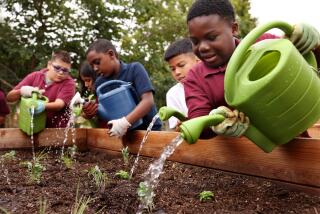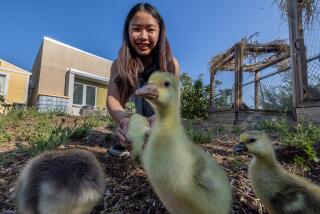. . . and the Lesson in Every Chore
California Supt. of Public Instruction Delaine Eastin is promoting a marvelous idea: A garden in every school. As coordinator of the Naturalist Academy at North Hollywood High School, I have had the opportunity to see the educational effects of ecological horticulture, a.k.a. organic gardening, on our students. If, in fact, we cannot build schools for the children of Los Angeles, let’s tear up the concrete and the asphalt and grow gardens!
The garden is a great place to teach kids about the birds and the bees. A pair of blue jays hangs out by our compost heap. After waiting in the wings for my students to pitch the pile, the birds swoop in to devour freshly exposed morsels, worms or miscellaneous larvae writhing in the moist rot. There are bees whirring among our broccoli flowers these spring days. In addition to consuming quantities of this healthy vegetable, we let some of the plants go to seed so that we can grow more next year.
Perhaps the latter example provides more opportunities for the students to realize the true intent of that beautiful metaphor--the rituals of reproduction, but in both cases there is far more to learn. As the poet Walt Whitman sings in “This Compost,” “What chemistry!”
In fact, gardening is the ultimate interdisciplinary catalyst. From science and math to history and literature, all are manifested in the art of gardening. From the sowing of the seed to the harvest of the seed, the lessons are abundant. Whether analyzing nitrogen, phosphorus and potassium or synthesizing respect, responsibility and delayed gratification, the learning happens in the head and in the hands. Doing is understanding.
Further, our historical antecedents in the realm of horticulture are many and important. Consider the legacy of learning from Gregor Mendel’s pea patch to Henry David Thoreau’s bean field, or from Thomas Jefferson’s plantation to George Washington Carver’s laboratory. In fact, the aptly named Howard Gardner of Harvard University, in his revised theory of multiple intelligences, identifies a “naturalist” intelligence. He thus illuminates the genius of these and other greats--like American botanist Luther Burbank, not to mention Charles Darwin and John Muir.
In the agriculture area at North Hollywood High School, we seek to cultivate this naturalist intelligence by having our students cultivate gardens. In addition to broccoli, we grow tomatoes and potatoes, peas and carrots, the “three sisters” of Native American agriculture--corn, beans and squash, as well as radishes, turnips, melons, cucumbers, myriad herbs and lots of sunflowers.
Starting in the fall, we endeavor to use organic methods by having the students remove the summer’s weeds by hand. Then, we shovel last year’s compost into the soil and form plots. At the same time, we rake leaves and start new compost piles. We germinate seeds for winter and spring crops in our greenhouse and continue to weed the plots by hand throughout the year. We also practice vermiculture and aquaculture, growing worms in boxes and fish and water plants in ponds.
This stewardship of nature, given the complex relationships in ecosystems, makes for many valuable learning opportunities. It is especially true when something goes wrong, and it invariably does. Insects, fungi, weeds, broken irrigation systems, bureaucratic roadblocks, school budgets, all present dilemmas that in turn present yet more learning opportunities.
*
Of course, some of my students have problems far worse than our difficulties in the garden, and I find that they sometimes turn to the patience and beauty of nature for solace. The modern teenager in the urban public high school can find the innocence of the birds and the bees appealing. Gardening guides the students’ attention to the realities of Mother Nature, the changing temperature of the seasons, the composition of Earth itself, the wind, the rain, the petrochemical sunsets over Los Angeles.
It is hard not to be pessimistic when confronting the grim realities in the Los Angeles Unified School District. Educational reform and school construction perennially drown in a morass of mediocrity. Thus, to my students I often paraphrase Voltaire’s Candide at the conclusion of the famous novel, “I don’t know if this is the best of all possible worlds, but I am going to cultivate my garden.”






